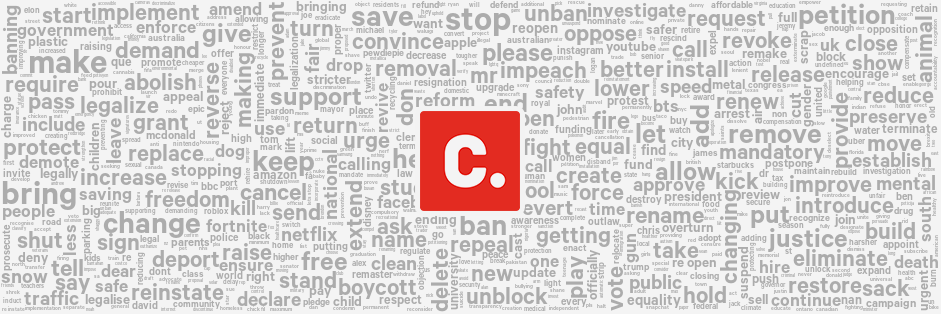With such little time to grab a reader’s attention, we were curious if some words were better than others for leading off a petition title. We suspected that popular advice such as using “positive,” “active,” or “motivational” words would show a positive relationship with petition success, but advice like this can be difficult to grasp for petition starters looking for more concrete examples when they’re just starting a petition on Change.org.
In order to do this, we utilized the General Inquirer, an aggregation of human-coded word tags in dozens of possible categories as simple as “Positive” vs. “Negative” or as complex as “Relates to morality” or “Implies direct causation.”
You may have some intuitions about which of these categories might matter, but what we found was somewhat surprising. Through this research, we discovered 5 categories of words reliably correlated with above-average petition performance.
The Types of First Words That Matter Most
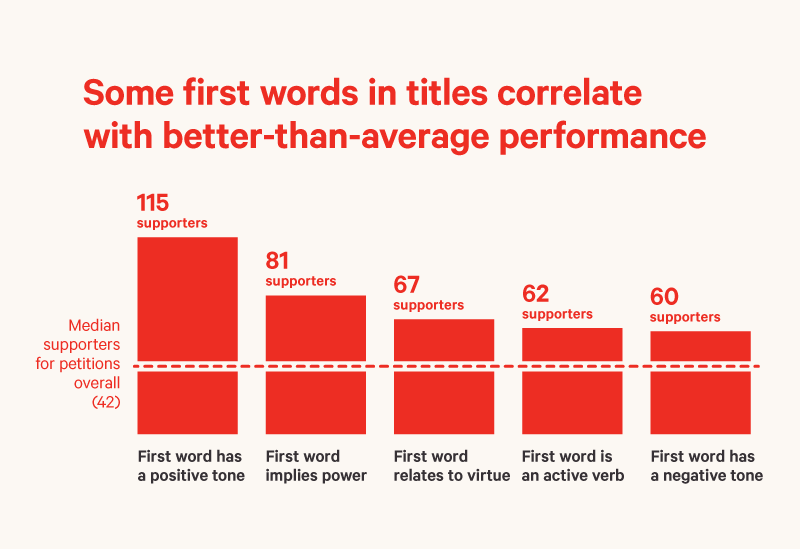
Exploring each of these categories, we quickly found examples of high-visibility petitions that effectively used words from each of the categories mentioned above:
- First word has a positive tone
- First word implies power or strength
- First word relates to virtue
- First word is an active verb
- First word has a negative tone
Diving deeper, we can infer more clues as to why these specific categories might be the most successful by looking in a more qualitative way. For example, both positive and negative words appear to be successful (though positive words are more successful overall), indicating that words with a high valence, positive or negative, are a strong choice for petition starters.
There are many lessons to be learned by looking at which specific words (not word categories) are disproportionately represented in the highest performing petitions.
The Specific Words That Work Best for Petition Success
One of our most interesting findings was that the most common words used were not necessarily the most effective. They were by no means poor performers, either, but we still expected to see more overlap between the most common words on the site and the most effective ones than what actually emerged in the analysis.
The most common words leading off a petition title on the site were nearly all action verbs—not surprising, given how common this sort of advice is. Words like help, stop, keep, and ban, are all very specific action verbs that were among the most common on the platform, and each enjoyed 2-5x the median number of signatures of for all petitions.
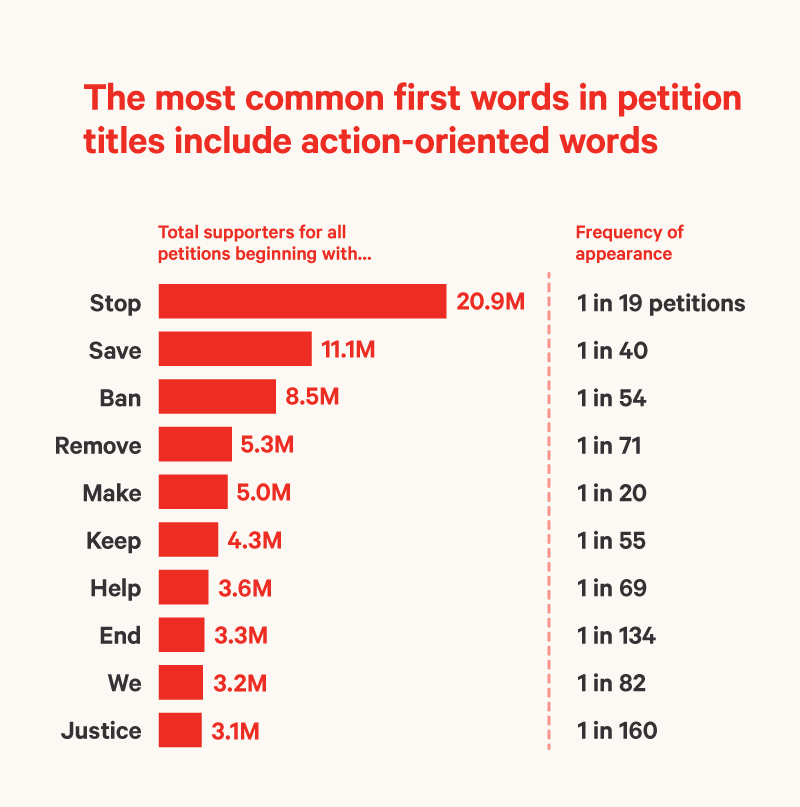
However, the most common words were by no means the most effective words. Words like grant, save, oppose, and protect are rarer, but when used they correlated with nearly 10x the median number of supporters for petitions not using them. This significant difference in efficacy is somewhat unexpected, and offers an exceptional opportunity for those who can utilize these words in their petition titles.
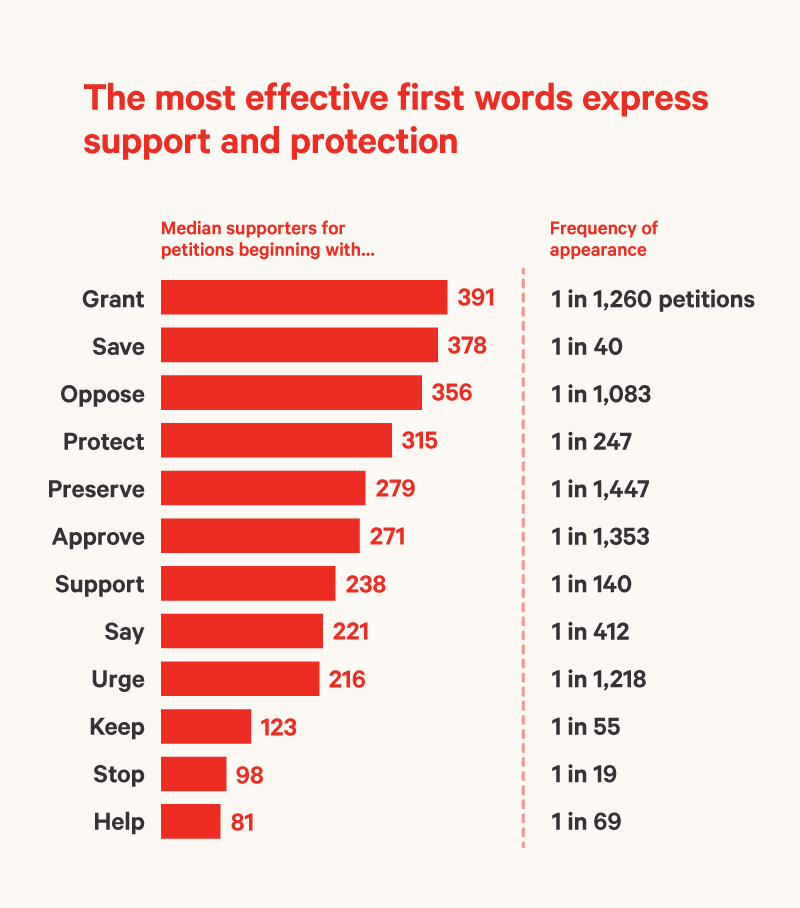
In general, these top performing words almost all seem to be related to helping those in need. Whether it is helping workers with disabilities, athletes exercising a right to free speech, individuals and families coping with cancer, or ordinary citizens seeking the right to protest, the focus on being of use to others seems key.
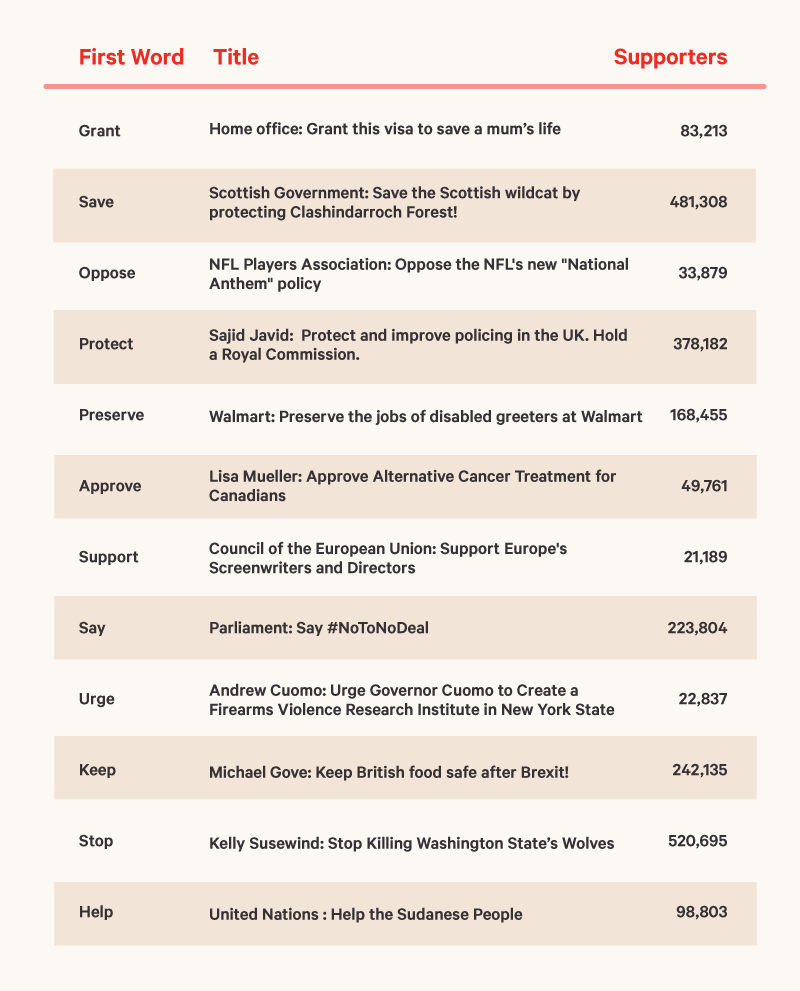
It’s also important to take into consideration the expectations and nuances of specific cultural audiences when crafting a headline. We also found some interesting and significant differences in first word effectiveness differences depending on the target country.
Cross-Cultural Differences in the Efficacy of Specific First Words
Cultural norms and expectations can differ significantly from country to country, and keeping these expectations in mind can play a large role in crafting the most effective petition title possible. For example, studiesone have found Brazilians, French, Swiss, and Maltese score highest for extroversion, while Nigerians, Moroccans, and Indonesians scored lowest. German speaking Swiss, Danes, and Germans scored highest for Openness while Hong Kong Chinese, Northern Irish, and Kuwaitis scored the lowest. Significant additional differences were found along all other personality aspects of Neuroticism, Conscientiousness, and Agreeableness.
Cultural personality differences were evident when we explored the most effective first words by country. In the United States, words related to justice and opposition were conspicuously popular, perhaps reflecting an American ethos of seeking justice and challenging authority. In Canada, the U.K., and Australia, the less-ambiguously pro-social term “Save” was the most effective first word, and the best-performing words seemed to be generally more positive than in the U.S. This is perhaps not surprising, as all 3 of these Commonwealth nations ranked above the United States in the latest World Happiness Report.
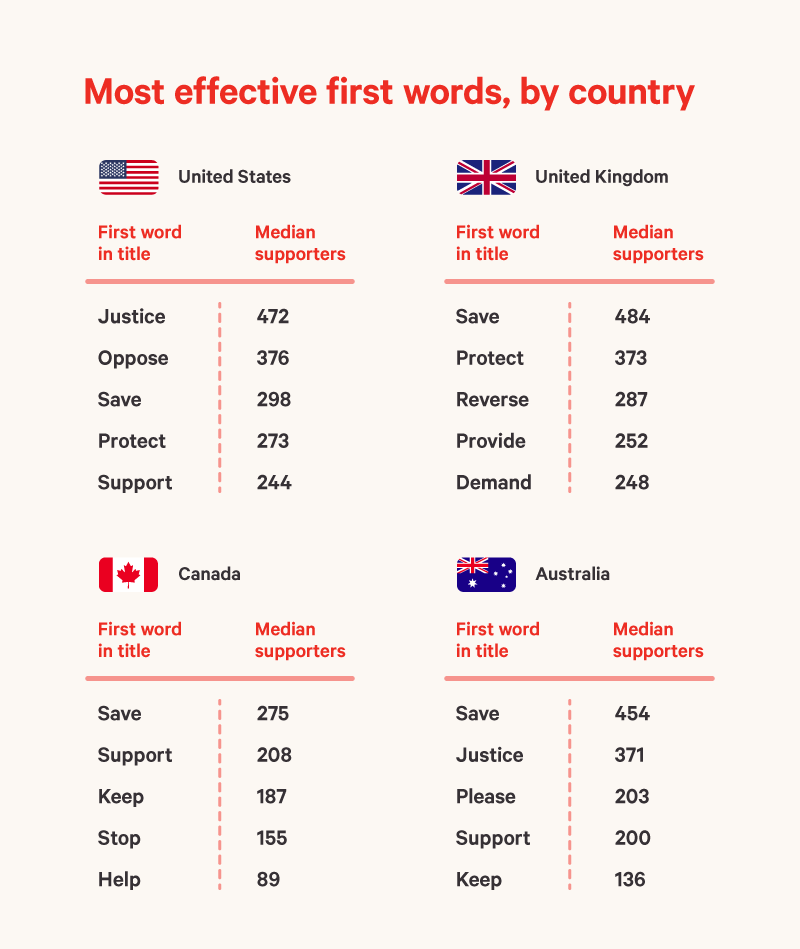
Thinking Critically About The First Word
While the data shows significant results for the impact of both categories of first words as well as some specific first words, it’s important to consider the selection of the first word in your petition title within the context of your goals. Shoehorning words shown to be more effective in general is not a good idea if doing so reduces the clarity of your title, so be sure to consider carefully weigh your word choice before starting your petition.
A good strategy could be writing out 5-10 variations on your petition title using language that comes naturally to you, then rereading this guide and editing your titles to utilize words that:
- Have an emotional tone (either positive or negative)
- Imply power or strength
- Relate to virtue
- Are active verbs
- Take into consideration any specific cultural considerations you know about your target audience
After editing your titles, select the one you feel leverages our findings on effective first words but also feels authentic to you—the best work on Change.org does, after all, come from the heart. While the work we’ve presented here should certainly give you a great starting off point, the very first word used in your title should still feel right for you, your mission, and your cause.
After you’ve read this guide and feel ready to get started, you can begin a petition on Change.org here.
Nick Allardice is the Chief Product Officer at Change.org. Twitter, LinkedIn.
Notes on Words Tested
As noted above, we tested several word categories from the General Inquirer that showed no reliable correlations, positive or negative, with petition signatures. The full set of tested words is as follows:
- Valence (positive or negative)
- Semantic:
- Strong
- Weak
- Active
- Passive
- Emotion, Virtue, and Vice
- Pain
- Feeling
- Arousal
- Emotion
- Virtue
- Vice
- Emotional Expressiveness
- Understated
- Overstated
- Institutionally-Related
- Religion
- Government
- Legal
- Military
- Political
- Arts/Sports/Self Expression
- Economics
- Academia
- Roles
- Activity
- Work
- Social Categories
- Race
- Gender
- Age
- Kinship
- Pronouns
- Yes/No, negations, and interjections
- Cognitive Orientation
- Verb and Adjective Types
- Verbs giving an interpretative explanation of an action, such as encourage, mislead, or flatter.
- Straight descriptive verbs of an action or feature of an action, such as run, walk, write, or read.
- Verbs describing mental or emotional states. usually detached from specific observable events, such as love, trust, or abhor.
- Adjectives referring to relations between people, such as unkind, aloof, or supportive.
- Adjectives describing people apart from their relations to one another, such as thrifty or restless.
- Power and Strength
- Rectitude
- Respect
- Affection
- Wealth
- Well-Being
- Enlightenment
- Skill

